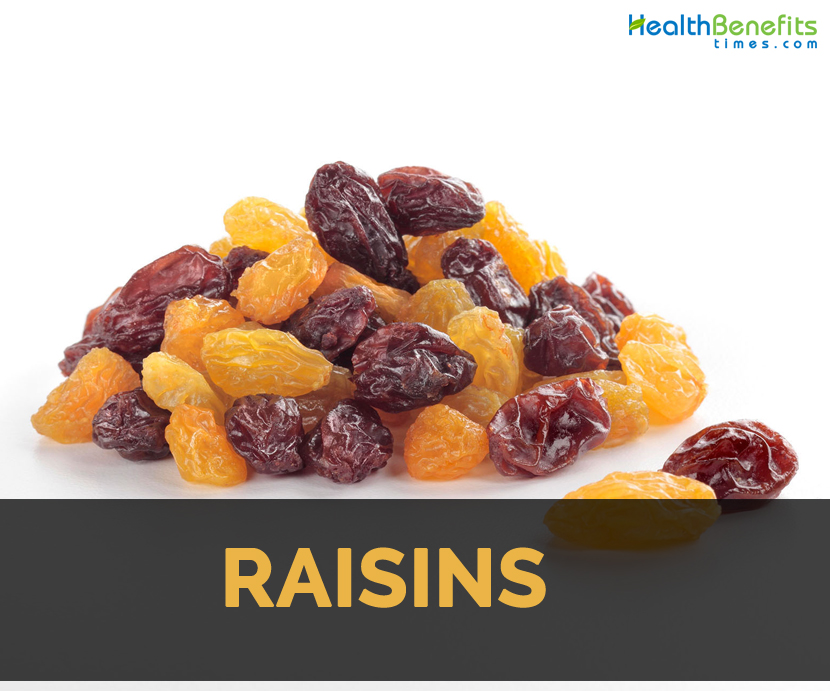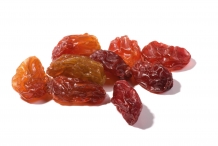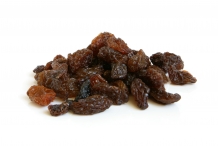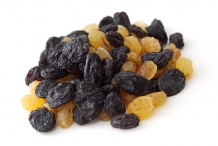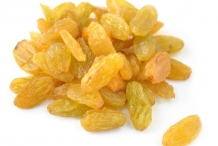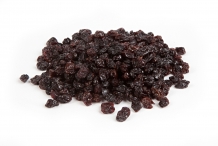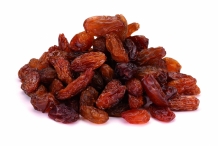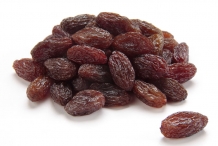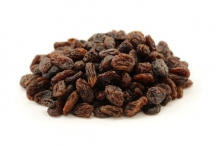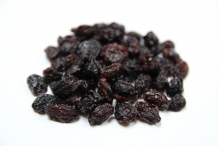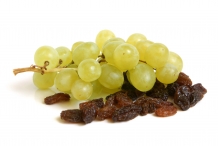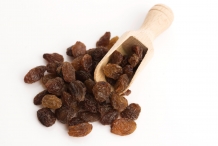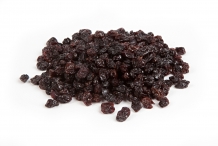| Raisins Quick Facts |
| Name: |
Raisins |
| Colors |
Golden, green or black |
| Taste |
Sweet |
| Calories |
493 Kcal./cup |
| Major nutrients |
Carbohydrate (100.50%)
Copper (58.33%)
Iron (38.75%)
Potassium (26.30%)
Phosphorus (23.86%)
|
| Health benefits |
Eye health, Oral health, Prevent constipation, Supports to gain weight, Cancer prevention |
Raisins are shriveled brown, yellow or purple morsels called raisins. Actually they are grapes which have been dried in a food dehydrator or sun. Usually they are added to yogurt, oatmeal, cereal or granola and salads. Due to its small size, raisins are loaded with energy and rich in vitamins, fiber and minerals. Raisins possess a sweet taste and have high content of calories and sugar. Still they are beneficial to health when consumed in moderate amounts. It supports digestion, keeps bone strong and promotes iron levels.
The varieties of raisin depends on type of grape used and could be found in variety of colors and sizes such as brown, black, green, yellow, blue and purple. Flame grapes, Greek currants and Sultana are the seedless varieties. Traditionally raisins are sun dried and also could be water dipped and artificially dehydrated.
Raisins contain phenolic compounds such as gallic, quinic, chrologeic and caffeic acids: epicatechin and catechin. Golden raisins contains health promoting compounds due to its antioxidant properties of sulfite which is used for the production of golden raisins hinder the loss of these compounds. In comparison to sun dried raisins and grapes, golden raisins have high content of antioxidant activities and phenolic content. The drying process to make raisins preserves and focuses the antioxidant properties of raisins.
History
Drying of grapes for making raisins is an ancient practice that goes back to thousands of years. Phoenicians and Armenians found earliest vineyards. It was mentioned in Old Testament of Bible several times. In ancient Rome and Greece, raisins were provided as prizes for events and sporting. Physicians used to prescribe it as an aid for ailments.
The raisin is discovered unintentionally, several years prior to Christ. People consumed grapes however didn’t know that when these were to dried out the grape, it might turn out to be this convenient as well as scrumptious dried out fruit known as the raisin. Experts declare that the Phoenicians as well as Armenians were the very first nations around the world to create raisins. Phoenicians set up vineyards in Spain as well as Greece which were fitted for growing raisins as well as the Armenians set up their vineyards within Iran, Turkey as well as Iraq. The Greeks and also Romans experienced a popular demand for raisins and after that some other nations began to utilize raisins too.
The term raisin goes back to Middle English and is also a loanword from Old French; raisin indicates “grape,” whilst, in French, a dried out grape is known as a raisin sec, or even “dry grape.” The earlier French word therefore was made from the Latin term racemes, “a number of grapes.” Raisin types depend upon the kind of grape utilized. Seedless types add the Sultana (also referred to as “Thompson Seedless” in the United States) as well as Flame. Raisins are usually sun-dried, however can also be “water-dipped,” or even dried out.
The process of drying out fruit was most likely identified accidentally. It really is possible that the forefathers discovered fallen fruit, which in fact had dried out under the sun, and also found out its sweet taste after sampling it. Proof has demonstrated that raisins were made by the Egyptians as soon as 2000 B.C. Raisins particularly have already been pointed out in historical writings and it also shows that these were utilized for consuming, dealing with health problems, and in some cases paying out taxes.
Through the entire ages, wine-making have been the most crucial utilize for grapes, even so, a modest amount of these grapes have invariably been converted to raisins. Throughout the later 1800s, Spanish missionaries from Mexico launched grapes in the United States of America. Most of the vineyard set up by these types of missionaries in California are still providing nowadays. These types of earlier vineyards were mainly utilized to create wines, but also in 1873 once the vineyard identified they might make quicker earnings by developing raisins, the raisin industry came into this world.
Medieval knights introduced raisins to Northern Europe as a sample in Persia and Mediterranean during Crusades. As cultivation spread to Germany and France, raisins became a valuable part of European cuisines. Generally, raisins came from Greece, Turkey and Iran. Currently United States is leading producer of raisins which is then followed by Australia. Grape vines were planted in California (America) in 18th century from where the raisins come from. In 1873, America’s first raisin crop occurred by accident when San Joaquin Valley suffered massive heat waves that dried grapes on vine before it have been picked.
Health Benefits of Raisins
Raisins are used to treat constipation, anemia, acidosis, sexual dysfunction and fever. It is also helpful to gain weight and have a positive impact on dental health, eye health and bone health.
- Eye health
Polyphenolic phytonutrients found in raisins possess antioxidant properties. These phytonutrients are helpful for ocular health as it protect eyes from free radical damage or macular degeneration, cataracts and loss of vision. Besides antioxidant properties, it contains meaningful amounts of beta carotene, Vitamin A and carotenoid that assist in maintaining ocular health.
- Oral health
Raisins possess phytochemicals that enhance gum and teeth health. Phytochemicals such as linoleic acid, oleanolic acid and linolenic acid helps to counteract bacteria in mouth that result in cavities. Replace sugary snack foods with raisins to maintain healthy smile. The chemical analysis identified botulin, oleanolic aldehyde, oleanolic acid, 5-(hydroxymethyl)-2-furfural and betulinic acid which are phytochemicals or antioxidants found in plants. Oleanolic acids prevent growth of two species of oral bacteria called Streptococcus mutans that causes cavities and Porphyromonas gingivalis causing periodontal disease. Oleanolic acid block adherence S.mutans to surfaces. Adherence is vital for bacteria for formation of dental plaque, a sticky biofilm which consists of oral bacteria accumulation on teeth. After the consumption of sugary meal, the bacteria release acids that deteriorate tooth enamel. (1)
- Prevent constipation
Raisins contain fiber in it which helps to add bulk to the food which moves through an intestinal tract and this provides relief from constipation. It contains insoluble fiber as it takes in water an gains volume. It is also helpful in stopping loose stools and absorb the liquid and lower frequency as well as unpredictability of diarrhea.
- Supports to gain weight
Raisins are helpful for those who are planning to gain weight. It is loaded with glucose and fructose and possesses high content of potential energy. It is an excellent diet for bodybuilders and athletes who requires powerful boost of energy or is helpful for those who wants to add weight without accumulation of unhealthy amounts of cholesterol. Due to the presence of amino acids, vitamins and minerals such as phosphorus and selenium that facilitates absorption of proteins and nutrients in the body. It assist in stimulation of absorption of vitamins, proteins and nutrients from food which promotes overall energy and strengthen immune system.
- Cancer prevention
Raisins have high content of catechins which are considered to be polyphenolic antioxidants found in blood. An antioxidant helps to eliminate free radicals present in the body and wreak havoc on organ systems and cells. Free radicals are the main cause for growth of cancer cells and the substance that could activate metastasis. Addition of raisins to the diet helps to increase antioxidant activity in system that prevents cancer and slows down its progression.
- Lowers hypertension
Raisins are believed to lower blood pressure and protect heart health. A positive correlation was shown between consumption of raisins and lowering of hypertension. Nutrients found in raisins are beneficial for maintaining overall health. High content of potassium helps to lower tension of blood vessels and lower blood pressure and dietary fiber found in raisins affect biochemistry of blood vessels and lower its stiffness that helps to lower hypertension.
The daily consumption of raisins helps to lower blood pressure significantly. The trial shows blood pressure effect of consuming raisins in the people with hypertension. The analysis of data showed that raisins lowers systolic blood pressure in few weeks in comparison to other snacks. The group analysis demonstrated that raisins lower diastolic blood pressure significantly. Packaged snacks such as cookies and crackers lower diastolic and systolic blood pressure in the studies. Study did not recognize how raisins lower blood pressure. Raisins have high content of polyphenols, fiber, tannins, phenolic and antioxidants. It is loaded with potassium that helps to lower blood pressure. (2)
- Diabetes treatment
Raisins help to reduce postprandial insulin response meaning that it could stabilize spikes or plunges on insulin after meal because it proves to be harmful to the diabetic patients. It assists in regulating the release of ghrelin and leptin which are the hormones responsible for informing the body when it is full or hungry. Raisins help to keep these hormones on check that maintains healthy diet and prevents overeating.
- Strong bones
Calcium is essential for bones which are found in raisins. Raisins are dried fruit which is a great source of boron (a micronutrient). Micronutrient is essential for body in very small amount. Boron is essential for proper formation of bones and efficient calcium absorption. It prevents osteoporosis persuaded by menopause in women. Raisins have high content of potassium that assist in strengthening of bones and enhance growth of bones by lowering the chances of osteoporosis condition.
- Lower inflammation
Raisins are a great source of polyphenols and nutrients. The studies show that raisins possess antioxidant and anti-inflammatory properties. Study was conducted to find out anti-inflammatory activity of five raisin extracts attentive on Nuclear Factor κB and Interleukin-8 pathway. An extract of raisin was characterized by High Performance Liquid Chromatography- Diode Array Detector analysis and isolated its ability for inhibition of Tumor necrosis factor α-induced IL-8 release. An effect was because of impairment of corresponding promoter activity. Data shows that consumption of raisins provides beneficial effect on gastric inflammatory diseases. (3)
- Sexual dysfunction
Raisins assist in stimulation of libido and promote arousal due to amino acid known as arginine that is helpful to treat erectile dysfunction. Arginine promotes level of sperm motility that enhances conception when engaging in sexual intercourse. In India, it is a common practice to make the groom and bride drink a glass of milk each which is boiled with a pinch of saffron and raisins on their wedding night. It is helpful for those who have issues of sexual endurance.
https://www.youtube.com/watch?v=Y9FYAtOMjug
Types of Raisins
Whether or not you require a practical treat or even additional sweet taste for cooking, raisins supply a useful advantage. The numerous types of raisins are usually filled with anti-oxidants as well as boron, a organic mineral which encourages healthy and balanced bone improvement. Raisins have got a lengthy shelf-life, and may also be plumped when dry-out takes place. Raisins are available in different types — possibly your preferred breakfast cereal includes a handful of various kinds. Every type of raisin has got differentiating qualities.
1. Thompson Raisins
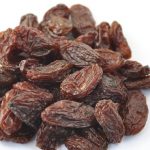
In accordance to the Cooperative Agricultural Pest Survey, seedless darkish brown raisins are definitely the most typical raisin within the U.S. marketplace, and therefore are cultivated through the Thompson green grapes. The raisin changes from green to darkish brown throughout the all-natural drying out procedure, that is created through sun drying without having chemical substances. Thompson raisins are helpful for baking, cooking as well as snack.
2. Sultana Raisins
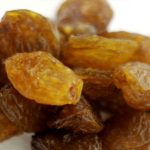
Sultana raisins can also be dried out from green Thompson grapes, but they are made by way of a various drying out technique. Just before drying out, the grapes are soaked in a treatment of potassium carbonate, water as well as essential olive oil, which usually boosts the drying out pace. Since the Thompson raisin usually spends more hours in the sunshine, sultana raisins are usually lighter colored. The raisins may also be cured with bleach to lighten up the color too. You are able to consume sultanas uncooked or even make use of them in for baking or even cooking.
3. Golden Raisins
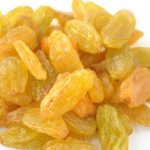
Golden raisins may also be manufactured from the green Thompson grapes, however have already been helped by sulfur dioxide to avoid the grape from altering color throughout the drying out procedure. These types of grapes are dried out along with synthetic heat as well as for a brief period of time, which usually results in a fat as well as fairly sweet outcome. Natural golden raisins are exceptional, however when discovered are darker in color. Even though utilized for baking and also cooking, you are able to consume golden raisins raw too.
4. Currants
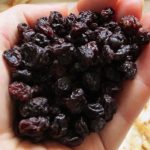
Currants, to never be mistaken with bush-grown berries, are made of the Black Corinth grape and therefore are one-fifth the dimensions of a typical raisin. Currants are extremely darkish colored, and also have a powerful sour taste. Their particular seeds are usually eliminated ahead of the drying out procedure, as opposed to some other raisins. Currants are usually mainly utilized in cooking because of their size.
5. Muscats
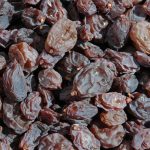
Muscat raisins are usually bigger than the normal raisin and in addition darker colored. Created from the Alexandria grape, Muscats are extremely sweet in taste. Usually the seeds have already been eliminated before the drying out procedure, however in the U.S. the procedure is less frequent. Muscats are mainly utilized in baking and are available throughout the fall and winter months.
6. Flame Seedless Raisins
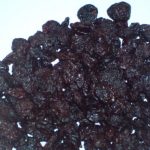
Flame raisins are generally somewhat bigger than normal raisins and therefore are a deep beautiful red colors. These types of raisins are usually mainly utilized in baking, and also have a powerful, fairly sweet taste. Due to their taste, you may enjoy them like a treat.
How to store Raisins
Raisins create a sweet snack or could be added to cereals, breads and salads. It could be utilized in cooking as its sour sweetness matches tasty sauces and glazes. Raisins are dried out grapes though a few dampness remains within the fruit. In a dry environment, it dries up as well as their sugar might crystalize. Its appropriate storage could continue to keep their taste and could be consumed for many months or even longer.
- Place the raisins in an air-tight storage bag or even pot. Press out as much air as you can.
- Seal the bag and put a cover on the pot. An air-tight bag or container prevents the raisins from crystallizing or switching stagnant.
- Keep raisins in the kitchen if you are planning to utilize them by their package’s use-by date. Put it within the fridge for about 1 year or even freezer for approximately two years.
References:
https://www.indifferentlanguages.com/words/raisins
https://davesgarden.com/guides/articles/view/5091/
https://www.healthline.com/health/food-nutrition/are-raisins-good-for-you#1
https://www.organicfacts.net/health-benefits/fruit/health-benefits-of-raisins.html
https://en.wikipedia.org/wiki/Raisin
http://www.stylecraze.com/articles/top-10-health-and-medicinal-benefits-of-raisins/#gref
Comments
comments


